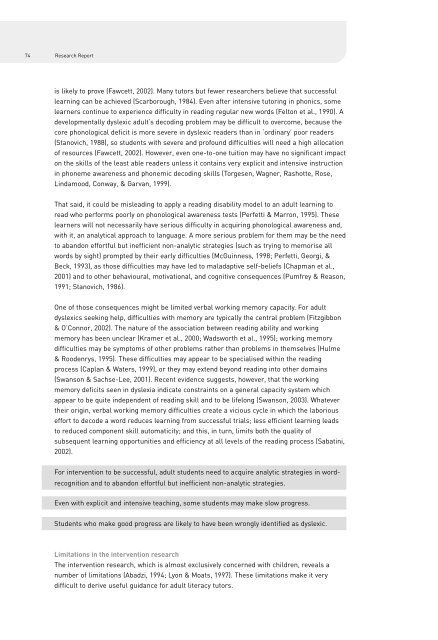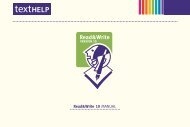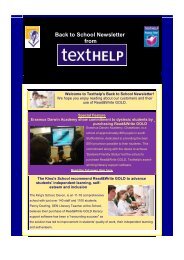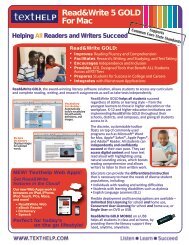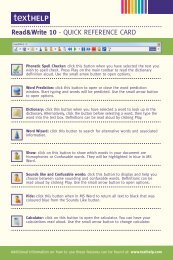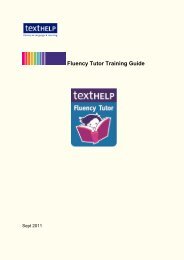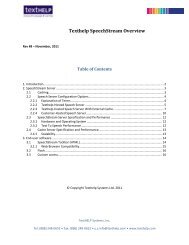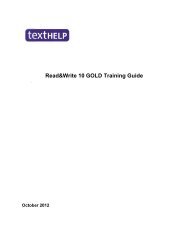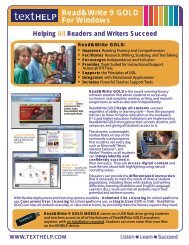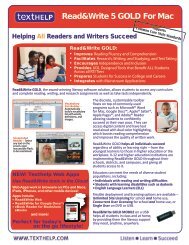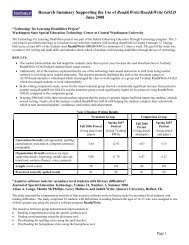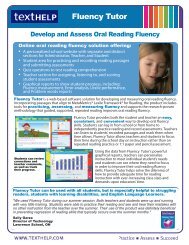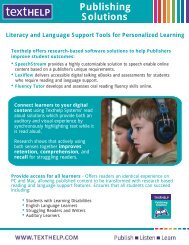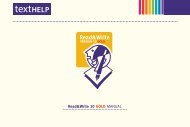01 NRDC Dyslexia 1-88 update - Texthelp
01 NRDC Dyslexia 1-88 update - Texthelp
01 NRDC Dyslexia 1-88 update - Texthelp
You also want an ePaper? Increase the reach of your titles
YUMPU automatically turns print PDFs into web optimized ePapers that Google loves.
74<br />
Research Report<br />
is likely to prove (Fawcett, 2002). Many tutors but fewer researchers believe that successful<br />
learning can be achieved (Scarborough, 1984). Even after intensive tutoring in phonics, some<br />
learners continue to experience difficulty in reading regular new words (Felton et al., 1990). A<br />
developmentally dyslexic adult’s decoding problem may be difficult to overcome, because the<br />
core phonological deficit is more severe in dyslexic readers than in ‘ordinary’ poor readers<br />
(Stanovich, 19<strong>88</strong>), so students with severe and profound difficulties will need a high allocation<br />
of resources (Fawcett, 2002). However, even one-to-one tuition may have no significant impact<br />
on the skills of the least able readers unless it contains very explicit and intensive instruction<br />
in phoneme awareness and phonemic decoding skills (Torgesen, Wagner, Rashotte, Rose,<br />
Lindamood, Conway, & Garvan, 1999).<br />
That said, it could be misleading to apply a reading disability model to an adult learning to<br />
read who performs poorly on phonological awareness tests (Perfetti & Marron, 1995). These<br />
learners will not necessarily have serious difficulty in acquiring phonological awareness and,<br />
with it, an analytical approach to language. A more serious problem for them may be the need<br />
to abandon effortful but inefficient non-analytic strategies (such as trying to memorise all<br />
words by sight) prompted by their early difficulties (McGuinness, 1998; Perfetti, Georgi, &<br />
Beck, 1993), as those difficulties may have led to maladaptive self-beliefs (Chapman et al.,<br />
20<strong>01</strong>) and to other behavioural, motivational, and cognitive consequences (Pumfrey & Reason,<br />
1991; Stanovich, 1986).<br />
One of those consequences might be limited verbal working memory capacity. For adult<br />
dyslexics seeking help, difficulties with memory are typically the central problem (Fitzgibbon<br />
& O’Connor, 2002). The nature of the association between reading ability and working<br />
memory has been unclear (Kramer et al., 2000; Wadsworth et al., 1995); working memory<br />
difficulties may be symptoms of other problems rather than problems in themselves (Hulme<br />
& Roodenrys, 1995). These difficulties may appear to be specialised within the reading<br />
process (Caplan & Waters, 1999), or they may extend beyond reading into other domains<br />
(Swanson & Sachse-Lee, 20<strong>01</strong>). Recent evidence suggests, however, that the working<br />
memory deficits seen in dyslexia indicate constraints on a general capacity system which<br />
appear to be quite independent of reading skill and to be lifelong (Swanson, 2003). Whatever<br />
their origin, verbal working memory difficulties create a vicious cycle in which the laborious<br />
effort to decode a word reduces learning from successful trials; less efficient learning leads<br />
to reduced component skill automaticity; and this, in turn, limits both the quality of<br />
subsequent learning opportunities and efficiency at all levels of the reading process (Sabatini,<br />
2002).<br />
For intervention to be successful, adult students need to acquire analytic strategies in wordrecognition<br />
and to abandon effortful but inefficient non-analytic strategies.<br />
Even with explicit and intensive teaching, some students may make slow progress.<br />
Students who make good progress are likely to have been wrongly identified as dyslexic.<br />
Limitations in the intervention research<br />
The intervention research, which is almost exclusively concerned with children, reveals a<br />
number of limitations (Abadzi, 1994; Lyon & Moats, 1997). These limitations make it very<br />
difficult to derive useful guidance for adult literacy tutors.


